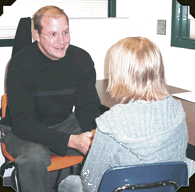
...a
School Counselor Greg Casel
 Jn
the 12 years that I have worked as a school counselor, I have
learned to come into school each day expecting the unexpected.
Many times there are joyful surprises. Just a few days ago
a senior girl came to the office in tears. Had she been kicked
out of her home? Become pregnant? Thankfully no, for through
her wet eyes she shared that she had just been accepted to
Duke University."The best thing that could ever happen!" she
announced.
Jn
the 12 years that I have worked as a school counselor, I have
learned to come into school each day expecting the unexpected.
Many times there are joyful surprises. Just a few days ago
a senior girl came to the office in tears. Had she been kicked
out of her home? Become pregnant? Thankfully no, for through
her wet eyes she shared that she had just been accepted to
Duke University."The best thing that could ever happen!" she
announced.
However,
just as common are those students whose tears are from sadness.the
death of a close family member or friend.another poor score
on the ACT.the boyfriend who has become emotionally abusive.
These
are common examples of experiences shared by the 1,700 middle
to upper-middle class students at Liberty Senior High School
in suburban Kansas City, Missouri. As a school counselor,
I am there to listen, advocate for, and partner with these
young adults as they experience the joys and frustrations
of their academic and social development.
I
typically arrive at work between 6 - 7 AM to organize my day
and priorities before confronting the constant stream of students,
teachers, phone calls, and emails. "Multi-tasking" is a buzzword
that is lived out by all educators, including the four other
counselors and three support staff members in our guidance
office. We balance two primary objectives: serving the specific
individual needs of students and administering special projects
such as standardized testing and scholarship programs.
Today,
I expect to individually meet with about 14 seniors to discuss
graduation progress and help guide them in their college and/or
career searches. We will discuss ACT scores, test preparation
opportunities, and career goals. Focusing on the college search
will find us partnering to narrow choices, plan campus visits,
and discuss scholarship opportunities.
This
is also a time where the diversity of student performance
can be seen. I switch gears from assisting the students who
are focused on highly competitive colleges, to the ones who
will struggle just to graduate on time. Each young person
needs the same basic skills from their counselor that my mentor
teacher from Iowa City West High, Gordon Mixdorf (PhD '75),
modeled to his many student teachers. These skills consisted
of "unconditional positive regard," patience, and at all times,
a problem-solving mindset.
First
today is the task of enrolling a transfer student. We have
about 150 students transfer into our school over the course
of a year, so this is a common morning activity. Making the
student and parent(s) feel welcome, answering questions, and
creating an appropriate academic schedule consumes the first
hour after school begins.
During
the day there will be students needing assistance for personal
issues, forcing another shift in process and approach. One
of the most powerful things someone can be given is the gift
of being listened to. Allowing students to transfer some of
their burdens onto the shoulders of caring adults is a wonderful
therapeutic endeavor. A counselor's goal should always be
to make school a good place for students-especially for those
whose lives outside of school lack the love and stability
that all adolescents need to be successful.
In
between the academic and personal counseling, I address different
administrative projects. These include writing junior and
senior newsletters, setting up College Planning Nights, promoting
ACT prep courses, selecting students for local scholarships,
and bringing in speakers on various adolescent socio-emotional
issues.
At
different points today I will also be forced to make some
"triage" decisions. An extremely upset student will come into
the office and will need to be seen right away. At that point,
I will have to decide whether I can end or delay the individual
meeting that I am in, or ask another counselor to assist by
attending to my student. I often feel pulled trying to be
responsive to everyone's needs in a timely manner, especially
when those needs are urgent. Being a student advocate means
"being there" when needed, and not a day goes by where I don't
feel that I should have tried to find a way to spend more
time with a particular student.
Since
I also serve as director of the high school guidance office
and the overall school district guidance program, other counselors
or faculty often seek me out for information or clarification
on a range of issues. It is crucial to be available to your
colleagues to make sure that everyone is being consistent
with their procedures and information. It is also important
to offer personal and professional support for all colleagues,
however difficult it may be in the midst of a busy school
day.
My
day moves by rapidly, and I find myself once again prioritizing
what needs to be done before I leave for the evening. As I
drive home, my mind shifts from the challenges, both good
and bad that occurred during the day, and my focus slowly
shifts to the unexpected that awaits tomorrow.
Before
Greg Casel (BA '90 - Secondary Education Certification)
became a counselor he taught seventh grade social studies
and English at Liberty Middle School and coached boys basketball.
He continues to coach on various athletic teams.